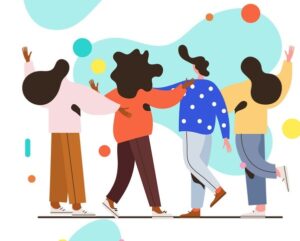Cherishing feminist friendships in an unequal world
March 19, 2020
by Meghan Cooper (International Women’s Development Agency) and Michelle Reddy (Fiji Women’s Fund)

2019 felt like a tough year, particularly if your day to day is confronting patriarchy and pervasive gender inequality. It was the year where over 300 human rights defenders working to protect the environment, indigenous rights, gender non-conforming rights and the right to free speech in 31 countries were killed in 2019[1]. It was also the year the world burned from California, Amazon, Russia, Indonesia, Lebanon and Australia, catastrophic fires that devastated countless habitats and livelihoods. The impact of climate change being felt globally..
While countries are battling the Corona Virus pandemic in these first few months, we must not lose sight of the fact that 2020 has been heralded as the year for the acceleration of women’s rights. In March, civil society, women’s rights organisations and the United Nations celebrated the landmark anniversaries of key fundamental international frameworks for women’s rights, albeit at a smaller scale than intended due to COVID 19[2]:
- 25th anniversary of the Fourth World Conference on Women where the adoption of the Beijing Declaration and Platform for Action took place in 1995.
- 20th anniversary of the Security Council Resolution 1325 on Women, Peace and Security, a momentous resolution that addressed the impact of war on women and strongly advocated for the full and equal participation of women in conflict resolution, peacebuilding and humanitarian response.
- 5th anniversary of 2030 Agenda for Sustainable Development and its Sustainable Development Goals
For women’s movements across the globe, 2020 provides a key opportunity to review the progress made towards achieving gender equality, to debate on the barriers that impede the full realisation of women’s and gender non-conforming rights. It’s also an opportunity to identify key strategies to accelerate progress and renew commitment to the necessary policy changes from governments and a range of decision makers. It can feel difficult attempting to move into a new year, particular after the year before, and one with such great expectation for it, but in thinking about how to tackle it, we are reminded of the importance of feminist friendships.
As we celebrate what we have achieved and move into a challenging new year, we continue to rely on feminist friendships as a key part of our work in the women’s movement because they ‘keep us grounded, secure and valued’. Friendships that speak the hard truths, share in your joys, celebrations and hardship. They come in many forms, but above all, they epitomise the understanding that the personal is political in feminist organising. And in this understanding, they support individual and collective movement in the fight for a feminist future. Many such friendships can and are created through the partnerships and collective action that exists within the feminist movement. Indeed, many people – including us – would consider ‘partnership is the natural state of being for feminist organisations.’
It was working for two organisations that shared this ethos that our friendship began – while working together in a feminist coalition in the Pacific, the first one of its kind. We met in a conference room at the beginning of a four-day intensive retreat with all partners involved and Meghan was the noticeable, nervous newbie just five days into her role. The months that followed were tough – the response and reality of Tropical Cyclone Winston. Through that, we shared information, connected regularly, learning about each other and our organisations, reflecting together while we tacked difficult conversations within and between partners related to resourcing, workload, and differing organisational positions.
Ultimately, we realised that the same actions we practiced such as transparency, collaboration, solidarity, equality – were principles that were key commitments to the coalition that first brought us together. Unlearning our personal biases as two women activists navigating power dynamics from the Global North and the Global South, a willingness to call out and call in.
Despite working in two countries and with different partners, we have continued to nurture our feminist friendship because it is tied to our strong feminist reality that the world is an extremely unequal place and that as individuals and as accomplices in the women’s movement, we are part of an eco-system that is working towards changing the power dynamics and in making this world a better place of women, girls and gender non-conforming people. Our paths have crossed and our friendship has helped us continually support our respective work in regional spaces such as the 13th Triennial Conference of Pacific Women and 6th Meeting of Pacific Ministers for Women[3], 2019 and 2020 Australasian Aid Conference[4], 2nd Pacific Feminist Forum[5] and now the call for the set-up of a regional women’s fund – the Pacific Fehttp://$f4minist Fund[6].
The friendships in the feminist movement, are as abundant as some of the divisions. Divisions according to power and privileges, resourcing and discrimination for the diversity of people who occupy the movement. Indeed, these are not small issues and can feel heavy on a daily basis. Having a friend who can call you out, ask you to step up or step back, to be honest with and be caring at the same time is a rare joy. It is one that makes it easier to envision the possibility of 2020 and beyond, to be the year where we shift the tides towards a more feminist future.
[1] https://www.frontlinedefenders.org/sites/default/files/global_analysis_2019_web.pdf
[2] https://iwda.org.au/2020-the-year-for-womens-movements/
[3] https://www.spc.int/sdp/13triennial
[4] https://devpolicy.crawford.anu.edu.au/annual-australasian-aid-conference/2019
[5] http://www.fwrm.org.fj/news/events/pacific-feminist-forum/2nd-pacific-feminist-forum-2019
Recent Whats New
WFF Visit to “Rise Beyond the Reef”
December 12 2023
LifeBread Confident Woman Program Graduation
December 12 2023

Leave a Reply